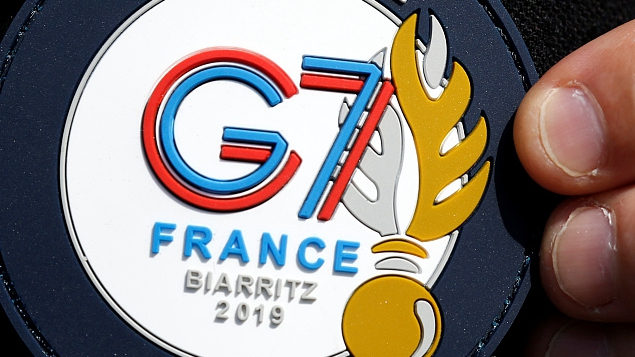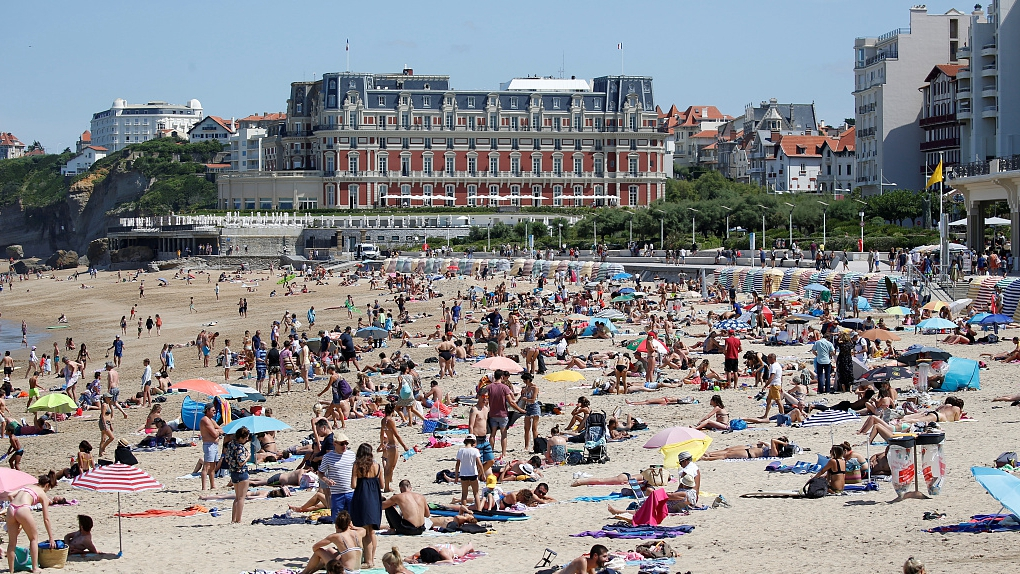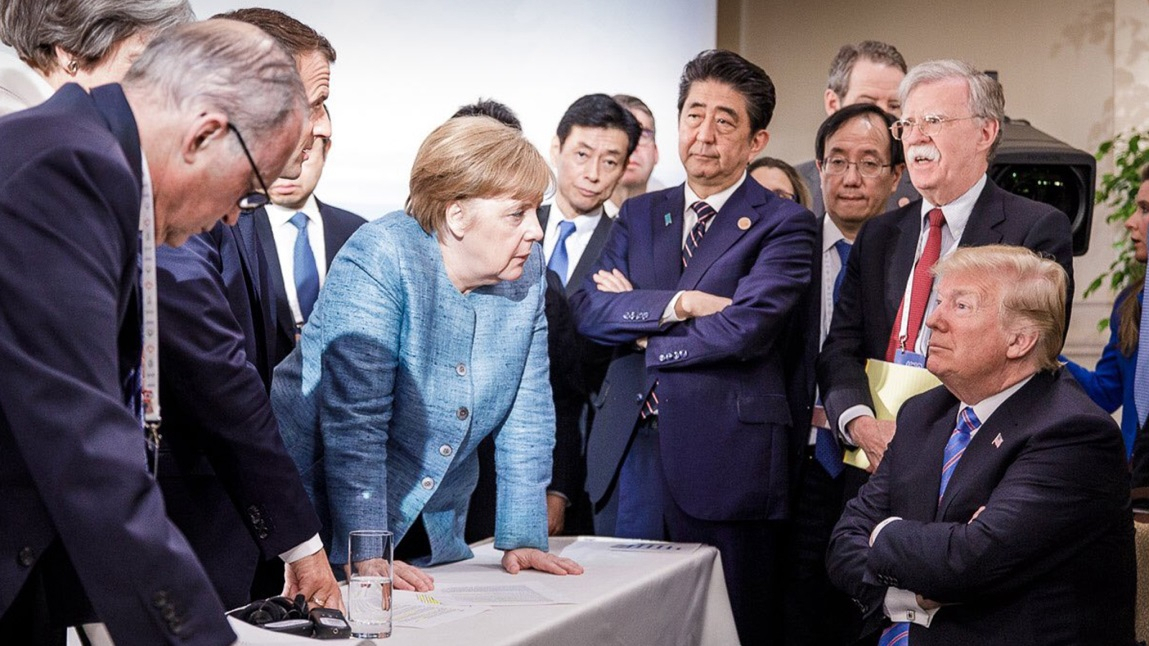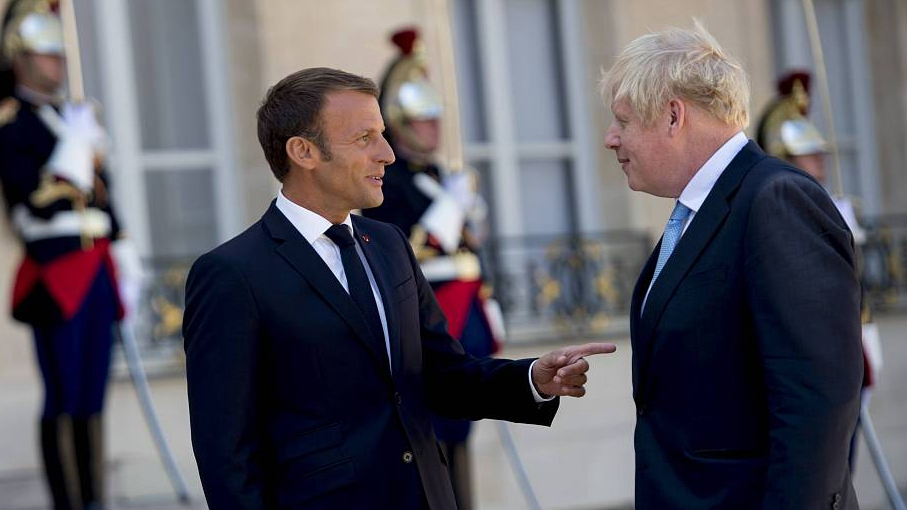

International summits are often an opportunity for national leaders to escape troubles at home and catch a breather in a faraway land: None of the G7 leaders due to gather in the French seaside town of Biarritz on Saturday is enjoying much sunshine at the moment.
The Europeans are particularly gloomy.
Giuseppe Conte has offered his resignation as Italy's prime minister, but is expected to attend the G7 while politicians at home fight over the next steps; Boris Johnson's hardline on Brexit puts him at odds with EU allies, and is leading Britain towards a no-deal or election; Angela Merkel's Germany is teetering on the verge of recession as she nears the exit door; and Emmanuel Macron's net approval rating among French voters hit negative 48 percentage points in a recent poll.

The beach and the Hotel du Palais summit venue ahead of the G7 summit in the French coastal resort of Biarritz, France, August 21, 2019. /VCG Photo
And the situation isn't much sunnier for the other three permanent members.
Canadian Prime Minister Justin Trudeau, shadowed by the SNC-Lavalin scandal, is facing a tough battle for reelection; Japan's Shinzo Abe is in the middle of a trade dispute with South Korea that on Thursday led to military intelligence-sharing pact being scrapped; and Donald Trump, with a slowing economy on his mind, continues to swipe from feud to feud.
So at the French seaside resort, will the leaders get any respite?
In the Trump era, there is no such thing as a harmonious multinational summit. The event hosted by Canada in 2018 was uniquely fractious: The U.S. president left early, criticized host Trudeau, and abruptly tweeted that he no longer backed an already-agreed end-of-summit communique.

German Chancellor Angela Merkel speaks to U.S. President Donald Trump at the G7 summit in Canada, June 9, 2018. /VCG Photo
That outcome – or lack of one – was a blow to the G7 mechanism. Macron is keen to avoid a similarly visible statement of division and has come up with a plan to avoid it: There will be no communique.
"We have to adapt formats. There will be no final communique, but coalitions, commitments, and follow-ups," Macron said in a pre-summit briefing on Wednesday. "We must assume that, on one subject or another, a member of the club might not sign up."
The French president indicated that he would seek areas where common ground could realistically be found with Trump while acknowledging that "when it's a campaign promise, you can't convince him otherwise."

G7 leaders pictured in La Malbaie, Quebec, Canada, June 8, 2018. /VCG Photo
But splits are nevertheless likely to be stark.
In the run-up to the summit, Trump, sniping at France and Germany, indulging in a bizarre row with Denmark over Greenland, declaring himself "the chosen one" amid accusations of anti-semitism and calling for the G7 to again become the G8 with the readmission of Russia, has given little indication he's willing to play ball with calls for unity.
Macron and Trump are engaged in their own personal spat over a tax on big tech companies.
Ten European countries have backed the French president's proposal for a three-percent digital tax, which, given the scale of U.S. tech firms, would primarily hit American multinationals. Trump responded to the plan by threatening to impose a 100 percent tax on French wine.
Read more:
Will G7 reach a compromise on digital tax?
Johnson takes first steps on global stage
The tech tax is likely to be one of the key issues on the table during the three-day summit. Macron has noted that a G7 finance ministers meeting in July signed off on the principle of tech companies being taxed in the countries where they make money, but whether Trump is on board with that plan is less clear.
Much attention will be on Johnson's summit debut, with speculation high that the new British prime minister will hold talks with Trump ahead of the main event as he looks for a post-Brexit trade deal. The U.S. and the EU have increasingly been at odds since 2017, and on some issues Johnson will be under pressure to choose a side.
Macron has warned Johnson that a deal with Washington will not compensate for Brexit, cautioning that such an agreement would come at "the cost of a historic vassalization" and that the British people do not want to "become the junior partner of the U.S."

French President Emmanuel Macron with Britain's Prime Minister Boris Johnson at the Elysee Palace in Paris, August 22, 2019. /VCG Photo
An early test for Johnson will be his stance on Iran. Tensions between Washington and Tehran have escalated since the U.S. withdrew from the 2015 nuclear deal, and Britain has stuck with European allies, China and Russia in seeking to keep the pact alive.
The British prime minister will be put under pressure from the U.S. to follow a harder line, and pushed by Macron – who was due to meet Iranian officials ahead of the summit – to work with European nations to deescalate tensions.
Similarly on trade, while a Japan-EU trade deal has now been inked, there is a stark division between the U.S. and Europe and "very tough" talks between Tokyo and Washington are ongoing.
Trump's primary tariff target has been China, but at a New Hampshire rally last week he made clear the EU – so far hit by U.S. tariffs on steel and aluminum, with levies on autos under review – could be next. "The European Union is worse than China, just smaller. It treats us horribly: barriers, tariffs, taxes," he told the crowd.

U.S. President Donald Trump speaks to supporters at a rally in Manchester, New Hampshire, August 15, 2019. /VCG Photo
Fears of a global slowdown are, at least in part, rooted in the tariff war Trump has waged on China. Going ahead with tariffs on automobiles alone would be a threat to a wobbling German economy, but Trump targeting the EU in the same way as China would have fallout beyond damaging the two slowing economies.
"EU-U.S. trade matters most. It is by far the biggest single bilateral trade flow in the world," Florian Hense, a Berenberg economist, told CNBC. "Counting exports and imports of goods and services, U.S.-EU bilateral trade exceeded that between the U.S. and China in 2018 by more than 70 percent."
Divisions between Washington and Brussels extend to climate change, energy and defense, but also threaten to create splits within the EU.
As part of any EU-U.S. trade deal, for example, Trump is demanding Europe opens up its agricultural sector – something Germany is willing to consider but France is not. That puts a wedge between the bloc's two biggest players.
Leaders from several other countries, including India, Chile, Australia, South Africa, Senegal, and Rwanda, as well as European Council President Donald Tusk, will also attend the summit which has a general theme of combating inequality.
With disputes on a wide range of topics – and the wildcards of Trump and Johnson in attendance – the diplomatic temperature in Biarritz is likely to be high once again.

Copyright © 2018 CGTN. Beijing ICP prepared NO.16065310-3
Copyright © 2018 CGTN. Beijing ICP prepared NO.16065310-3